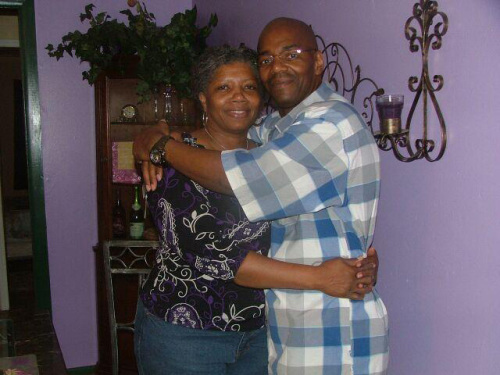DALLAS, Texas (AFP) ― After spending more than 30 years in a Texas prison for a crime he did not commit, Cornelius Dupree Jr. became a free man when his conviction was overturned.
Dupree, who was sentenced to 75 years for kidnapping, rape and robbery, had his conviction reversed in a Dallas courtroom Tuesday when State District Judge Don Adams declared him “free to go.”
Dupree, 51, who had been released from jail on parole last year, is one of 265 people in the United States exonerated in recent years through the development of DNA tests of key evidence.
The high-profile exonerations have undermined faith in the justice system ― particularly witness identifications ― and have led to increased calls for legal reforms and the elimination of the death penalty.
“It’s a joy to be free again,” Dupree said at a press conference following the hearing attended by his supporters.
“Words really won’t make up for what I have lost. I lost both of my parents. I just feel that the system needs to be fixed.”
Dupree, who was sentenced to 75 years for kidnapping, rape and robbery, had his conviction reversed in a Dallas courtroom Tuesday when State District Judge Don Adams declared him “free to go.”
Dupree, 51, who had been released from jail on parole last year, is one of 265 people in the United States exonerated in recent years through the development of DNA tests of key evidence.
The high-profile exonerations have undermined faith in the justice system ― particularly witness identifications ― and have led to increased calls for legal reforms and the elimination of the death penalty.
“It’s a joy to be free again,” Dupree said at a press conference following the hearing attended by his supporters.
“Words really won’t make up for what I have lost. I lost both of my parents. I just feel that the system needs to be fixed.”

Only two other U.S. inmates who were exonerated by DNA evidence have spent more time in prison than Dupree, according to the Innocence Project, a New York-based legal center which is representing him.
James Bain spent 35 years in jail in Florida, and Lawrence McKinney spent more than 31 years behind bars in Tennessee.
“We need to do something in the state of Texas and in this country to make sure that this never happens again,” Dallas County District Attorney Craig Watkins said after Dupree’s hearing.
Watkins said more needs to be done to improve how the justice system handles evidence and vowed to push the Texas legislature to pass a bill which would improve how police handle eyewitness identifications.
“Misidentification is the single greatest cause of wrongful convictions in the United States,” said Barry Scheck, co-director of the Innocence Project.
Eyewitness misidentification played a role in 75 percent of the wrongful conviction cases overturned by DNA evidence, according to the group.
While eyewitnesses provide police with what is often their best evidence in a crime, a growing body of research has found that people often fail to remember critical details, especially from stressful situations.
Traditional police lineups can also lead witnesses to choose the person who most closely resembles the perpetrator.
Several states have adopted new lineup practices, such as presenting photos or people one at a time instead of all together and asking the witness to make a statement as to how confident they are.
Dupree was one of two men wrongly convicted of a 1979 abduction, robbery and rape.
The rape victim misidentified Dupree and Anthony Massingill in a photo lineup as the men who raped her after she and a male friend were carjacked and robbed.
The male victim could not identify either man in the lineup but during the trial both victims identified Dupree as one of the assailants.
Dupree was paroled for good behavior in July after years of fighting his conviction. Two weeks after he was released, DNA test results showed that he was innocent.
Dupree has been living in Houston since his parole with his wife Selma, who he met 20 years ago when he was in prison. He married her the day after he was released.
“I’m feeling great,” she said before the hearing began. “I’m glad that we finally made it to this day.”
Massingill, 49, was not at the hearing but DNA evidence also proved his innocence, and his lawyers are working on an exoneration, Innocence Project spokesperson Paul Cates said.
He is also serving time for a second rape, and DNA testing of the evidence is scheduled soon in an attempt to clear him of that charge.
Richard Miles, one of several exonerated prisoners who attended Tuesday’s hearing, described the ruling as a “spiritual rebirth.”
“Even though his parole released him physically, he wasn’t released mentally and spiritually” said Miles, who was released from prison in 2009 after serving 14 years for a murder he didn’t commit.
“Now he is.”








![[Graphic News] More Koreans say they plan long-distance trips this year](http://res.heraldm.com/phpwas/restmb_idxmake.php?idx=644&simg=/content/image/2024/04/17/20240417050828_0.gif&u=)
![[KH Explains] Hyundai's full hybrid edge to pay off amid slow transition to pure EVs](http://res.heraldm.com/phpwas/restmb_idxmake.php?idx=644&simg=/content/image/2024/04/18/20240418050645_0.jpg&u=20240419100350)





![[From the Scene] Monks, Buddhists hail return of remains of Buddhas](http://res.heraldm.com/phpwas/restmb_idxmake.php?idx=652&simg=/content/image/2024/04/19/20240419050617_0.jpg&u=20240419175937)

![[KH Explains] Hyundai's full hybrid edge to pay off amid slow transition to pure EVs](http://res.heraldm.com/phpwas/restmb_idxmake.php?idx=652&simg=/content/image/2024/04/18/20240418050645_0.jpg&u=20240419100350)

![[Today’s K-pop] Illit drops debut single remix](http://res.heraldm.com/phpwas/restmb_idxmake.php?idx=642&simg=/content/image/2024/04/19/20240419050612_0.jpg&u=)